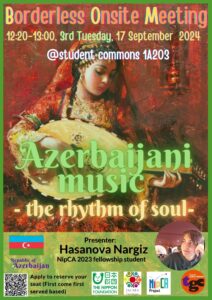The 9th Borderless Onsite Meeting took place on Tuesday, September 17, 2024, in association with Global Commons.
The presenter this time is Ms. Hasanova Nargiz, a 5th cohort NipCA fellow from Azerbaijan. In January 2024, Ms. Nargis gave a presentation titled “Azerbaijan – the Land of Fire, and more -” introducing Azerbaijan’s World Heritage sites, the Nowruz festival, and food culture. This time, she focused specifically on music, speaking on the theme “Azerbaijani music – the rhythm of soul –”.
The roots of Azerbaijani folk music trace back to the ancient Silk Road. Azerbaijan, located at the crossroads of the East and West, has absorbed various influences from the musical traditions of Persia, Turkey, Arabia, and the Caucasus, creating a unique and diverse musical heritage. It is also said to be influenced by European classical music. Also, there are nearly 90 instruments, and the main instruments among them were introduced along with their sounds.
As for the genres of music, traditional folk music, Ashiq music, Meykhana, and mugham are the most distinct genres, among which mugam is the most important in Azerbaijani music. Mugham originates from the Arabic word “maqam”, which means “moment”, and it can be performed both vocally and instrumentally. Mugham is the mother of Azerbaijani music, it is the essence of culture and it is also a philosophy, so it is said that all emotions are contained in mugham.
The actual performance was introduced through a video, and by watching the dance synchronized with the music, participants were able to experience Mugham for the first time, making it a valuable experience.






